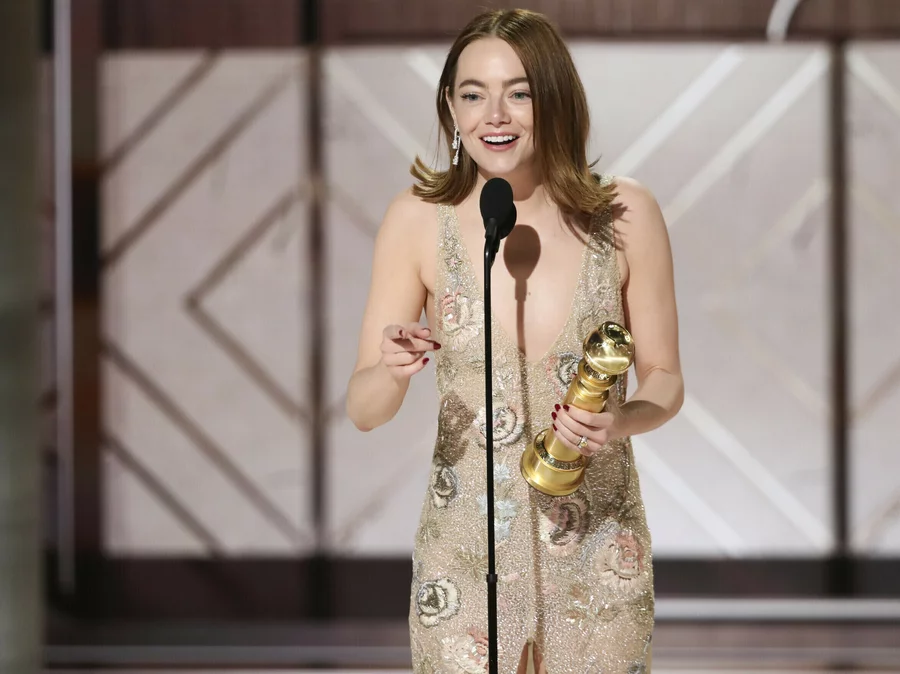Christopher Nolan’s cinematic opus “Oppenheimer” wielded its dominance at the 81st Golden Globes, securing a total of five accolades, notably clinching the coveted best drama award.
Meanwhile, Yorgos Lanthimos’ unique take on Frankenstein, “Poor Things,” managed to disrupt expectations and emerge triumphant in the best comedy or musical category, outperforming the formidable contender, “Barbie.”
If the awards season had been building anticipation for a Barbenheimer rematch, this particular round unequivocally favored Oppenheimer.
The film not only secured the prestigious best drama title but also garnered additional victories for Nolan’s direction, Cillian Murphy’s portrayal as the best drama actor, Robert Downey Jr.’s supporting actor role, and Ludwig Göransson’s exceptional musical score.
Producer Emma Thomas, in her acceptance speech for the night’s final award, acknowledged the challenges of creating a three-hour, R-rated, dialogue-intensive film on one of history’s darkest chapters. She expressed gratitude to Universal chief Donna Langley for their collective achievement.

In the realm of comedy and musicals, “Poor Things” claimed not only the best picture award but also recognized Emma Stone’s compelling performance as Bella—a Victorian woman navigating a surreal existence and a transformative sexual awakening.
Emma Stone, interpreting the unconventional nature of “Poor Things,” remarked, “I perceive this as a romantic comedy, wherein Bella falls in love with life itself rather than an individual. Embracing both the positive and negative aspects equally altered my perspective on life.”
Lily Gladstone made history as the first Indigenous winner in the best actress category for Martin Scorsese’s “Killers of the Flower Moon,” delivering part of her speech in the language of her native tribe, Blackfeet Nation.
The 81st Golden Globes marked a new chapter in its long history, navigating uncertainties after the dissolution of the Hollywood Foreign Press Association. The revamped awards ceremony, now hosted by CBS, sought to reclaim its position as the third major awards show of the year, introducing changes even to its menu, featuring sushi from Nobu.
Acknowledging the transformation, Robert Downey Jr., in his acceptance speech, humorously thanked the “Golden Globes journalists for changing their game, therefore changing their name.”
Host Jo Koy initiated the event in the Beverly Hilton International Ballroom, touching upon expected topics such as Ozempic, Meryl Streep’s award-winning streak, and the enduring Oppenheimer saga. Despite a minor stumble in one of his jokes, Koy, thrust into the role just ten days before the event, addressed the audience’s expectations.
Downey’s victory in the best comedy actor category denied Kenergy a win, with Ryan Gosling considered a formidable competitor. The much-anticipated clash between Oppenheimer and Greta Gerwig’s “Barbie” unfolded in various categories, with Nolan ultimately triumphing in the best director category.
Barbie, a blockbuster with over $1.4 billion in ticket sales, secured its first award for Billie Eilish’s “What Was I Made For?” in the best song category. The film later received the Globes’ new accolade for “cinematic and box office achievement,” accepted by Margot Robbie in a pink gown reminiscent of 1977’s Superstar Barbie.

In a surprising turn of events, the best screenplay category, where Barbenheimer faced off, witnessed an upset as Justine Triet and Arthur Harari claimed victory for the script of the French courtroom drama “Anatomy of a Fall.” Triet’s film further secured the best international film award.
While the Golden Globes don’t directly influence the Academy Awards, they serve as a crucial marketing boost for awards contenders entering the Oscar nomination phase. With the dynamic duo of Barbenheimer leading the pack, contenders like “Poor Things” and “The Holdovers” also stand poised to make an impact.
Paul Giamatti and Da’Vine Joy Randolph both earned recognition for their performances in Alexander Payne’s “The Holdovers.” Giamatti, reuniting with Payne two decades after “Sideways,” secured the best actor award, while Randolph’s supporting role as a grieving woman garnered her well-deserved acclaim.
Hayao Miyazaki’s “The Boy and the Heron” caused an upset in the best animated film category, surpassing the expectations set by “Spider-Man: Across the Spider-Verse.”
On the television front, the final season of “Succession” dominated, securing best drama series for the third time, alongside individual wins for Matt Macfadyen, Sarah Snook, and Kieran Culkin. Hulu’s “The Bear” also received three awards, including best comedy series and individual acting recognitions for Jeremy Allen White and Ayo Edebiri.
In conclusion, the 81st Golden Globes, now under new management, navigated a challenging yet transformative journey.
Despite past controversies and uncertainties, the event continues to serve as a vital platform for Hollywood studios, offering a strategic marketing boost to films vying for awards recognition. As the industry grapples with a potentially precarious 2024 at the box office, the Golden Globes maintain their significance in shaping the narrative of success in the world of cinema.
